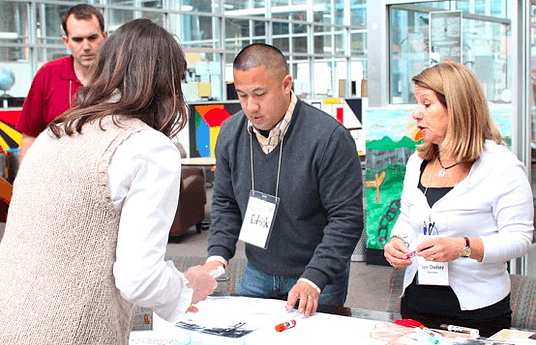Millions of teachers worldwide need help to improve the quality of teaching. There are not enough ‘expert’ trainers to meet this need directly, and cascade training is not effective, with ideas and practices getting lost in transmission. Teachers need to see real life examples of how they can make learning more effective via small changes that can make a big difference over time.
The Trainer in Your Pocket replaces ineffective one-off teacher professional development (TPD) workshops with ongoing support. Teachers use authentic videos on their phones to improve their teaching of specific subjects or stages of learning. They see teachers like themselves, their classrooms, and their students, while a narrator highlights what the teacher in the video is doing differently and supports noticing and reflection. Teachers can use the videos anytime, at home or at work, on their own and with their peers. TPD meetings are made more effective by providing opportunities for teachers to discuss the video content and its application in their classrooms.
In UK Aid-funded English in Action (www.eiabd.com), led by Cambridge Education with The Open University, UK, as academic lead, the videos were used by 54,000 teachers teaching 7.4m students in Bangladesh. Students’ ability to communicate in basic English rose from 36% to 70% and from 40% to 80% at primary and secondary level.
This innovation by The Open University, UK, spread from Bangladesh to India, Nigeria, Zambia and Zimbabwe. Bangladesh’s Government is now using video in at-scale TPD courses on its national eLearning platform.
Classroom videos from the TESS-India TPD programme have had over 3.5M views.
The approach has been integrated in Teacher Development Programme, Nigeria, enhancing learning outcomes for over 2M young Nigerians each year.
Zambia’s teachers use the videos off-line on their phones linked to Raspberry Pis at Teacher Group Meetings. Lesson time spent in student group and pair work has tripled (5% to 15%).
We aim to embed the innovation across TPD programmes in Sub-Saharan Africa and South East Asia in the areas of Early Childhood Education, Foundational Literacy/Numeracy and Science.
Teachers must be provided with examples of classroom practice that they can identify with, be inspired by, and learn from. All that is required for making the videos are teachers willing to improve teaching/learning, academic advisors to coach them for the filming and a narrator to guide other teachers in applying variants of these practices with their own learners. For info: tom.power@open.ac.uk


